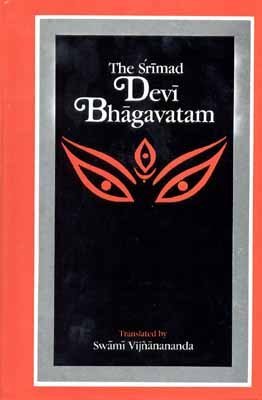The Devi Bhagavata Purana
by Swami Vijñanananda | 1921 | 545,801 words | ISBN-10: 8121505917 | ISBN-13: 9788121505918
The English translation of the Devi Bhagavata Purana. This Sanskrit work describes the Devi (Divine), the Goddess, as the foundation of the world and as identical with Brahman, the Supreme Being. The Devi Bhagavata Purana is one of the most important works in Shaktism, a branch of Hinduism focusing on the veneration of the divine feminine, along w...
Chapter 31 - On the Yama's giving Śakti Mantra to Sāvitrī
1-2. Nārāyaṇa said :-- O Nārada! Hearing thus the supreme nature of Mūla Prakriti from Dharmarāja Yama, the two eyes of Sāvitrī were filled with tears of joy and her whole body was filled with a thrill of rapture, joy and ecstacy.
She again addressed Yama :-- “O Dharmarāja! To sing the glories of Mūla Prakriti is the only means of saving all. This takes away the old age and death of both the speaker and the hearer.
3-12. This is the Supreme Place of the Dānavas, the Siddhas, the ascetics. This is the Yoga of the Yogins and this is studying the Vedas of the Vaidiks. Nothing can compare even to one sixteenth of the sixteenth parts of the (full) merits of those who are in Śakti’s Service; call it Mukti, immortality, or attaining endless Siddhis, nothing can come to it. O Thou, the foremost of the Knowers of the Vedas! I have heard by and by everything from Thee. Now describe to me how to worship Mūla Prakriti and what are the ends of karmas, auspicious and inauspicious.” Thus saying, the chaste Sāvitrī bowed down her head and began to praise Yama in stotras according to the Vedas.
She said :-- “O Dharmarājan! The Sun practised of yore very hard austerities at Puṣkara and worshipped Dharma. On this, Dharma Himself became born of Sūrya as his son. And Thou art that son of Sūrya, the incarnation of Dharma. So I bow down to Thee. Thou art the Witness of all the Jīvas; Thou seest them equally; hence Thy name is Samana. I bow down to Thee. Sometimes Thou by Thy own will takest away the lives of beings. Hence Thy name is Kritānta. Obeisance to Thee! Thou holdest the rod to distribute justice and pronounce sentence on them and to destroy the sins of the Jīvas; hence Thy name is Daṇḍadhara; so I bow down to Thee.
(Note :-- Any Jīva, in course of his travelling towards Mukti, can expect to pass through the stage Yamaship; and if he pleases, he can become a Yama.) At all times Thou destroyest the universe. None can resist Thee. Hence Thou art named Kāla; so obeisance to Thee! Thou art an ascetic, devoted to Brahmā, self-controlled, and the distributor of the fruits of Karmas to the Jīvas; Thou restrainest Thy senses. Hence Thou art called Yama. Therefore I bow down to Thee.
13-17. Thou art delighted with Thy Own Self; Thou art omniscient; Thou art the Tormentor of the sinners and the Friend of the Virtuous. Hence Thy name is Puṇya Mitra; so I bow down to Thee. Thou art born as a part of Brahmā; the fire of Brahmā is shining through Thy body. Thou dost meditate on Para Brahmā, Thou art the Lord. Obeisance to Thee!” O Muni! Thus praising Yama, She bowed down at the feet of Him. Yama gave her the mantra of Mūla Prakriti. How to worship Her and He began to recite the fruition of good Karmas. O Nārada! He who recites these eight hymns to Yama early in the morning, getting up from his bed, is freed of the fear of death. Rather he becomes freed of all his sins. So much so, that even if he be a veritable awful sinner and if he recites daily with devotion this Yamāṣṭakam, Yama purifies him thoroughly.
Here ends the Thirty-first Chapter of the Ninth Book on the Yama’s giving Śakti Mantra to Sāvitrī in the Mahāpurāṇam Śrī Mad Devī Bhāgavatam of 18,000 verses by Maharṣi Veda Vyāsa.
